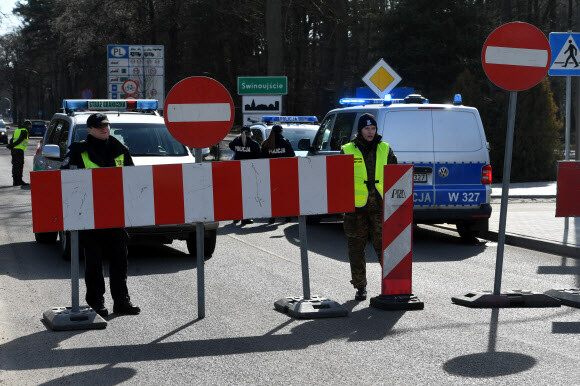hankyoreh
Links to other country sites 다른 나라 사이트 링크
<span>[Column] </span>Coronavirus: Cooperation Versus Quarantine

Pathogens don’t know anything about borders. They don’t care about history or ethnicity. They are interested in just one thing: reproduction. They are constantly in search of places where they can be fruitful and multiply.
Trade and war have been the great facilitators of the plagues that have periodically decimated the human race. Soldiers and merchants, by traveling from place to place, helped spread the Black Death in the fourteenth century and the Spanish flu in the twentieth century, both of which killed about 50 million people.
The latest pandemic, the coronavirus, is no different. People traveling on business in and out of Wuhan, the capital of Hubei province and the epicenter of the outbreak in China, gave the pathogen new hosts to infect. The commerce of tourism also helped out, as the coronavirus has taken advantage of close quarters on cruise ships and airplanes to jump from body to body.
More than 100,000 people around the world so far have been infected. That includes tens of thousands of people in China, thousands of people in South Korea, and hundreds of people in Japan.
One immediate response to the latest epidemic has been to shut down sites of infection. To start off, the Chinese government locked down Hubei, a province of nearly 60 million people. Traffic in and out of the province has effectively ended, and residents are still confined to their homes. The rate of infection in Hubei and throughout China has dropped considerably as a result.
The Italian government has followed suit. It began by imposing a travel ban on its northern provinces.
Some medical professionals have praised this quarantine approach, arguing that the Chinese government slowed the spread of the disease and gave other countries more time to prepare for the inevitable. But epidemiologists are also skeptical whether such an approach is ultimately effective since another outbreak could take place once travel resumes and infected people reintroduce the virus to areas that had (temporarily) eradicated the disease.
Also, it’s not easy for quarantines to work in democratic countries. The quarantine in Italy is not as tight as the one in Hubei. People fled Milan and other places in the northern regions as soon as the new measures were announced, and many residents were still going out into public even as the government pleaded with them to stay home. The Italian government has subsequently imposed the ban on the entire country, severely restricting movement around the country and closing schools as well.
In this age of rekindled nationalism, leaders have called for tougher border controls – this time not just against immigrants but against anyone traveling from countries with high infection rates, like Italy and Iran. The Trump administration, for instance, implemented a 30-day travel ban on anyone coming from continental Europe, creating chaos for Americans caught there for business or on vacation.
Japan, meanwhile, has pledged to put anyone coming from South Korea or China into a two-week quarantine. It’s one of dozens of countries that have imposed such restrictions. Mongolia and Turkey, for instance, won’t even allow in people who have recently been in or transited through South Korea. But the South Korean government has singled out the Abe government for criticism and also eliminated visa waivers for Japanese visitors.
Shutting down cities and closing borders seem to be plausible responses to a crisis that is amplified by travelers and border crossers. But ultimately such measures provide a false sense of security, particularly when it comes to a pathogen like the coronavirus.
First of all, it looks as though the coronavirus is turning out to be only a little more lethal than a bad influenza virus. The large majority of those infected experience only mild symptoms. And some victims of the disease pass on the infection when they’re still asymptomatic. That means that the coronavirus spreads far more easily than more lethal diseases like Ebola, where there’s no evidence that the asymptomatic infect other people.
With diseases like the coronavirus, unless it is contained immediately at its source, the best that can be hoped for is mitigation. That means ensuring that at-risk populations – the elderly, those with underlying conditions – avoid contact with the general population. It means more aggressive screening, as South Korea has instituted, and aggressive isolation of those infected. It means targeting resources at those hospitalized with more severe symptoms.
It also means that increasing cross-border cooperation, rather than shutting it down, is the key to addressing the problem. In the absence of a robust, global response to pandemics – and such a response is unlikely given opposition from leaders like Trump – countries must push for regional coordination.
The coronavirus is a test run for this kind of cooperation. The next pandemic might be more lethal, might spread more quickly, and might be able to mutate into something even deadlier.
Japan, South Korea, China, and North Korea have myriad disagreements about borders, history, trade, and security. The coronavirus couldn’t care less. It has created its own regional alliance that speaks only one language: the language of infection.
The countries of Northeast Asia should take this opportunity to create a regional scientific consortium, a regional transportation authority, a regional medical response team, and a regional fund to help less affluent areas deal with disease.
Such cooperation, ideally, would extend to other pressing matters: climate change, sustainable energy, and arms control. But let’s start with something basic, like pooling knowledge about the coronavirus, its effects, and its weaknesses.

Regional cooperation requires a common enemy. Such an enemy mobilized its troops in Wuhan and has now invaded every country in the region. It’s time for South Korea, Japan, North Korea, and China to put aside their historical and territorial differences and fight this enemy together.
By John Feffer, director of Foreign Policy In Focus
The views presented in this column are the writer’s own, and do not necessarily reflect those of The Hankyoreh.
Please direct questions or comments to [english@hani.co.kr]

Editorial・opinion
![[Column] Season 2 of special prosecutor probe may be coming to Korea soon [Column] Season 2 of special prosecutor probe may be coming to Korea soon](https://flexible.img.hani.co.kr/flexible/normal/500/300/imgdb/original/2024/0426/3317141030699447.jpg) [Column] Season 2 of special prosecutor probe may be coming to Korea soon
[Column] Season 2 of special prosecutor probe may be coming to Korea soon![[Column] Park Geun-hye déjà vu in Yoon Suk-yeol [Column] Park Geun-hye déjà vu in Yoon Suk-yeol](https://flexible.img.hani.co.kr/flexible/normal/500/300/imgdb/original/2024/0424/651713945113788.jpg) [Column] Park Geun-hye déjà vu in Yoon Suk-yeol
[Column] Park Geun-hye déjà vu in Yoon Suk-yeol- [Editorial] New weight of N. Korea’s nuclear threats makes dialogue all the more urgent
- [Guest essay] The real reason Korea’s new right wants to dub Rhee a founding father
- [Column] ‘Choson’: Is it time we start referring to N. Korea in its own terms?
- [Editorial] Japan’s rewriting of history with Korea has gone too far
- [Column] The president’s questionable capacity for dialogue
- [Column] Are chaebol firms just pizza pies for families to divvy up as they please?
- [Column] Has Korea, too, crossed the Rubicon on China?
- [Correspondent’s column] In Japan’s alliance with US, echoes of its past alliances with UK
Most viewed articles
- 1Is Japan about to snatch control of Line messenger from Korea’s Naver?
- 2Up-and-coming Indonesian group StarBe spills what it learned during K-pop training in Seoul
- 3‘We must say no’: Seoul defense chief on Korean, USFK involvement in hypothetical Taiwan crisis
- 4[News analysis] Using lure of fame, K-entertainment agency bigwigs sexually prey on young trainees
- 5[Column] Park Geun-hye déjà vu in Yoon Suk-yeol
- 6Is N. Korea threatening to test nukes in response to possible new US-led sanctions body?
- 7Korea’s 1.3% growth in Q1 signals ‘textbook’ return to growth, says government
- 8Division commander ordered troops to enter raging flood waters before Marine died, survivor says
- 9Report reveals toxic pollution at numerous USFK bases
- 10[Editorial] Statue should not be central concern of comfort women issue